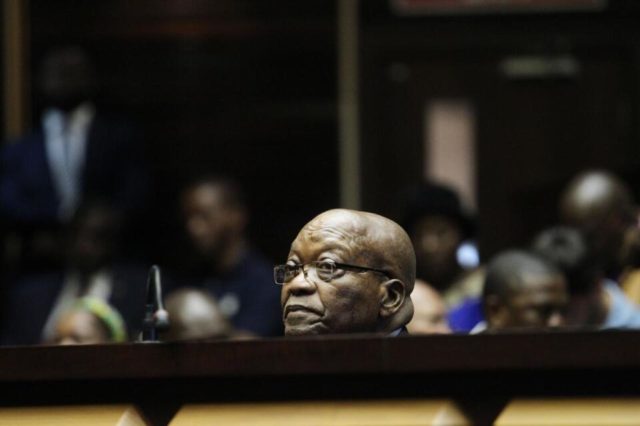The high court had no jurisdiction to hear a criminal trial in a civil court, making it irregular.
The Pietermaritzburg High Court “committed gross errors of fact and law” when it dismissed former president Jacob Zuma’s application for a permanent stay of prosecution in his graft case, according to Zuma’s application to appeal the ruling.
Furthermore, according to Zuma’s legal team, the high court had no jurisdiction to hear a criminal trial in a civil court, making it irregular.
In October, Judges Jerome Mnguni, Esther Steyn and Thoba Poyo-Dlwati unanimously dismissed the stay of prosecution applications made by Zuma and his co-accused Thales, with costs.
The case concerns the so-called arms’ deal of the mid-90s, in which the State contends Thales bribed Zuma via his former financial advisor, Schabir Shaik, in order to protect the company from a probe into the deal.
Shaik was found guilty on two counts of corruption and one of fraud in 2005. He was sentenced to 15 years’ imprisonment but was later released on medical parole.
The case against Zuma has been in and out of the courts for over a decade, until South Africa’s former chief prosecutor, Shaun Abrahams, announced in 2018 that charges would be reinstated against Zuma and Thales.
But according to Zuma’s leave to appeal the high court ruling, judges Mnguni, Steyn and Poyo-Dlwati had ignored a 2006 high court ruling about the “prejudicial conduct” the National Prosecuting Authority (NPA) had displayed towards Zuma.
The judges further ignored that the NPA had “conceded” its conduct had prejudiced Zuma’s rights to a fair trial, according to the documents.
“The high court erroneously concerned itself with irrelevant factual considerations and ignored the relevant one, alternatively, failed to accord the relevant one, sufficient weight in assessing the true constitutional questions as to whether the NPA’s conduct justified a permanent stay of prosecution.”
The court had also disregarded the “incontrovertible” evidence of political interference, according to Zuma’s application, as seen in the 2009 finding of Judge Chris Nicholson.
The Nicholson judgment was later overturned by the Supreme Court of Appeal (SCA).
Nevertheless, according to Zuma’s legal team: “The high court ought to have found that on its own version, the NPA submitted that there was unlawful political interference in the prosecution of Mr Zuma.
“The high court failed to have regards whatsoever on the constitutional and statutory obligations of the NPA to conduct its constitutional mandate independently, impartially, without fear, favour or prejudice.
“Had it done so, it would have found that the NPA’s admitted misconduct deviated from the mandatory constitutional and statutory standards to justify the granting of a permanent stay of prosecution. In this regard, the high court could have relied on (the Nicholson judgment) which gave a coherent, detailed and insightful reference on the constitutional and statutory obligations of the NPA.”
Zuma’s legal team also said the court had “erred” in disregarding constitutional issues, including Zuma’s right to a fair trial. The court should have found that not trying Zuma together with Shaik was a violation of these rights.
Also, the court’s finding that Zuma was not prejudiced by the lengthy trial delay because he eventually became president was an error, according to Zuma’s leave to appeal.
“The high court ought to have found that Mr Zuma became president despite the established and admitted gross violations of his constitutional rights by the NPA.”








